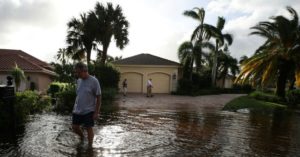Flood prevention and safety
Almost anywhere it rains, it can flood. Even if you live in an area that you think isn’t at risk. Before we get into how you can prevent, limit or react to flooding, it’s important to note that flood damage is typically not covered by your homeowners or renters insurance. You will need a separate policy for flood insurance.
Preparing for a flood
The Federal Emergency Management Agency recommends a number of steps to stay safe during emergencies and limit damage from flooding. You should:
Build an emergency kit for your family containing such items as drinking water and nonperishable food for each member of your family (two-week supply), flashlights, a radio, extra batteries, a first-aid kit, necessary medications, personal hygiene items and copies of important documents. Create a communication plan so family members can reach one another.
Acting during a flood
If a flood is likely in your area, quick action may be necessary to protect your family and property. You should:
Get information from the radio or television. If you need to evacuate, secure your home and turn off utilities if instructed to do so, and disconnect electrical appliances. Do not drive into flooded areas. If you are caught in your vehicle in floodwater, abandon your car and move to higher ground if you can do so safely. If you have evacuated your home, do not return until authorities tell you it is safe.
Coping after a flood
Flooding can cause emotional stress along with physical hazards, so be mindful of the well-being of you and your family during the aftermath. Floodwater can be contaminated by oil, gasoline or sewage, so avoid contact as much as possible. Make sure your city’s water supply is safe to drink. Clean and disinfect everything that was in contact with floodwater. The Red Cross has a free book available called “Repairing Your Flooded Home,” which contains useful information as you clean up. It’s available at www.redcross.org. Of course, don’t hesitate to contact us as well — we’re ready to help!
Flooding is one of the most common hazards in the U.S. Being prepared for any emergency is crucial for the safety of you and your family. Don’t be caught off guard!

 D5 Creation
D5 Creation